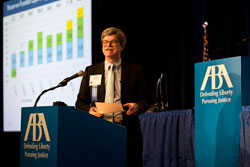ABA House of Delegates approves dues increase

Lucian Pera: “This is not a traditional dues increase.” Photo by Wayne Slezak.
The ABA House of Delegates approved the increase by voice vote during the ABA Midyear Meeting in early February. There were only a few no votes.
Those admitted to the bar less than a year will pay nothing under the new schedule, but most other lawyers will pay annual dues ranging from $140 to $449. The price of individual membership is lower for government and legal services lawyers, solos and judges. In that group, lawyers who have been admitted to the bar for at least a year will pay annual dues ranging from $115 to $255. Dues for those experiencing financial hardship will remain the same at $50.
The changes take effect in the 2014-15 fiscal year, according to Resolution 177C, which outlines the dues increase proposal. For the next three years after that, dues will rise to reflect the increase in the cost of living unless the ABA Board of Governors intervenes to reduce or eliminate the COLA.
The 13 percent hike is less than inflation over the last eight years, according to a report accompanying the resolution. The increase “ranks well below the average increase of past dues increases,” the report says, “and comes after an interval twice the average time between dues increases” enacted between 1990 and 2007.
Without a dues increase, important ABA programs and services would be cut, the report says, carrying the possibility that members would quit because their membership would have less value to them.
SHORTFALL SCALED BACK
The recommendation to raise dues comes after a “redoubled effort” to study and stabilize association finances, the report says. 0perating costs have been cut, producing savings of more than $17 million in the past four years. Reserves have been recalculated and reallocated to produce an expected $9.7 million in each of the next three years to support operating expenses. And an aggressive approach to nondues revenue is projected to yield at least $5.6 million in net new revenue over the next three years.
ABA Treasurer Lucian Pera supported the dues increase. Absent an increase, the ABA was expected to face a $28 million shortfall over the next three years. “This is not a traditional dues increase,” Pera said, because it will not close the entire budgetary gap. Instead, it will decrease the projected shortfall to about $4 million. The rest of the shortage will have to be made up elsewhere, he said.
Meanwhile, in an emotional speech during the House session, ABA President James R. Silkenat criticized Congress for failing to adopt gun legislation after the December 2012 shootings in Newtown, Conn., that claimed the lives of 20 elementary school children and six school staff members.
Fighting back tears, Silkenat said he has a farm near Newtown and he knows how the tragedy devastated families who lost loved ones. “I’m still heartsick that Congress was unable to respond to the tragedy that took place in Newtown,” Silkenat said. “Congress failed to prevent these tragedies of the future.”
Silkenat said many lawmakers appear more concerned about their gun lobby approval rating than protection of their constituents.
The ABA has taken a strong stance in favor of laws to prevent gun violence since the assassination of President John F. Kennedy, Silkenat said. More recently, the ABA backed legislation to improve background checks for gun owners, fight gun trafficking, and limit military-style assault weapons and high-capacity ammunition magazines. Those reforms are consistent with the U.S. Supreme Court’s Second Amendment opinion in Heller, which acknowledged limits on gun ownership, Silkenat asserted.
Silkenat noted that there are strongly held views on all sides of the topic, but lawyers have a responsibility to participate in the discussion of the legal issues. “America’s legal response to gun violence so far is unacceptable,” he said.
In other action, the House passed resolutions calling for access to effective appellate representation for juveniles in delinquency cases; urging businesses to adopt policies against child labor and trafficking; urging governments to enact laws and policies to prevent homelessness when foster children age out of the system; and calling for increased funding and a reordering of priorities to fight hunger in the United States.
After eight years without a dues increase, the ABA will hike the cost of individual membership by about 13 percent on average for most members.
This article originally appeared in the April 2014 issue of the ABA Journal with this headline: “House Approves Dues Increase: President Silkenat also makes heartfelt plea for gun control.”
Write a letter to the editor, share a story tip or update, or report an error.


